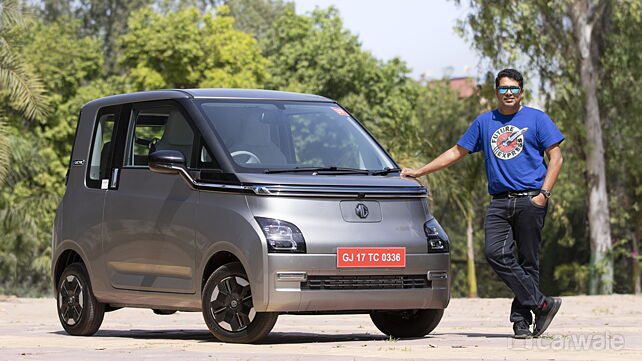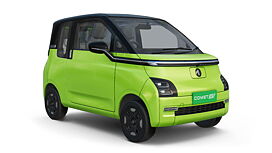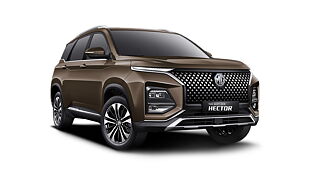Why would I buy it?
- Compact size
- Excellent ride quality
- Unique ownership experience
Why would I avoid it?
- Restricted to city use only
- No fast charging option
What is it?

If we go by MG’s definition, the Comet EV isn’t just a car but also a very cool gadget. However, let’s see where it stands with our definition. We think the MG Comet EV is the ideal spiritual successor to the original micro-car of India, the Tata Nano. Well, one could compare it to the Maini Reva or the Mahindra E2O, but then those electrics sold far too less and have far less history than the Tata Nano.

With the Comet EV, MG Motor wants to offer the ideal solution for city commutes and at the same time be practical, premium, and economical. So, we drove this tiny electric car on the crowded streets of Gurugram to see where it actually stands.

On the outside, the MG Comet EV looks like nothing else on the road. It’s just under 3 metres long, and about 1.5 metres wide. But it stands tall at over1.6 metres. These dinky dimensions aside, it’s pretty stylish. The large rakish windscreen tapers into one of the smallest bonnets you will ever see. Right below the bonnet, you have the horizon connecting light, which extends all the way to the outside rearview mirrors. You get twin barrels, all LED headlights, and a small little air dam which is flanked by the indicators.

The side profile is where the Comet EV looks the funkiest. It looks like a shrunken little hatch, and the way MG has fused the door window with a vertical rear window is pretty cool. Even with its tall height, the 12-inch wheels don’t really look awkward. Overall, the MG Comet EV looks more radical than quirky, and that’s all thanks to cars like the Reva, E2O, and the Nano, which already gave India a glimpse into the world of microcars.
Is the cabin of the Comet EV any good?

For MG, it was clear right from the start that the Comet EV needs to have premium interiors and all the modern-day features. And that’s pretty much what it gets. The cabin is a mix of grey and white, which makes the cabin feel bright and airy. The almost conventional dashboard, which misses out on a glove box, is a mix of glossy white plastic and fabric. You also get an aluminum finish around the centre aircon vents and a piano black finish around the aircon controls. There is no fancy flat-bottom steering but a regular meaty one with audio and other controls on it.

The party piece however is the floating twin display. So you get two 10.4-inch screens fused together making up the infotainment system and the digital instrument console. This unit gets wireless Android Auto and Apple CarPlay along with a host of 55-plus connected car features and voice commands. The quality of materials like the plastic and the switches are decent and the buttons operate with a nice tactile feel.

Getting to the seating, one can immediately notice that there is no transmission tunnel and as a result, there is no separation in the footwell. So basically if you have two tall people sitting in the front, there are chances that the co-passengers’ feet might intrude into the driver’s feet area.

The seat itself is comfortable, but the seat squab is a little short, which means under-thigh support is a little lacking. The driving position is super with fantastic visibility all around, and this should be an easy car to drive even for the newbies.

Moving to the back bench means using the one-touch slide knob on the front seat and squeezing in. Now this might be slightly impractical for the elderly if they have to get in and out multiple times, but it could work well for the Gen-Zies. The seating at the rear is average, and that is expected, thanks to the Comet’s ultra-compact dimensions. However, seating three people at the back is possible but it’s an absolute squeeze as even with two people, it is a slightly touchy affair.

Legroom is manageable, but the lack of under-thigh support is amplified at the rear. With the battery placed below the cabin, the floor is quite raised, which is the reason for the high knee seating position.

On the practicality front, the cabin gets storage space on the dash, door pocket, and near the armrest. Boot space is minimal and won’t fit much more than a grocery bag. But then you do have the option to fold the rear seats flat and make space for luggage.

Another thing that we noticed was that the white plastics and light-coloured fabric on the dash and seats are dirt magnets and very easy to stain. So, one will have to make quite an effort to keep the cabin clean.
Is the Comet EV good to drive?

Powering the Comet EV’s rear wheels is a permanent magnet synchronous motor and providing the juice is a 17.3 KWH lithium-ion battery. The motor makes 41bhp and 110Nm of torque. Now, these are decent figures considering the Comet EV barely weighs anything.

Getting behind the wheel, the Comet EV feels extremely easy to drive right from the get-go. There is a slight motor whine as you move off but the throttle response, as expected, is immediate. To make things interesting you also get three modes to choose from – eco, normal, and sport.

While there is barely any difference between eco and normal, sport mode does hurry things up a little. But don’t expect it to scorch the roads; this is a commuter EV after all.

Driving the Comet EV on the busy streets of Gurugram, you cannot help but notice how ideal a car of this size is to drive around in town. The Comet EV overtakes quickly, is easy to place into gaps, and is extremely easy to park as well. The steering has some weight to it but is light enough to make an effortless drive in the city.

But what’s really good is the ride quality. MG has done a fantastic job with the tuning of the suspension, and the Comet EV makes light work of potholes and rumbler strips. With 165mm of ground clearance, no speed breaker is too tall for the Comet EV either. The tall springs and the high centre of gravity do play spoilsport when you corner too hard, but after a certain amount of initial roll, the Comet EV feels confident. We will give you a proper report of the ride and handling once we get the car for a longer duration.

Now let’s get to the important part, the range. MG claims a range of 230km on a full charge. Now this is something we couldn’t test, considering we barely got the car for a few hours, and all we managed to do was driving to the shoot location and back. That said, MG claims that because of the prismatic cells used in the battery, the Comet EV will do a real-world range of around 200km, but that is something we will verify soon. The Comet EV also gets three levels of re-gen, which should help further.

Charging the MG Comet EV is a slightly long process. In a bid to keep costs down, it does not get a fast charging option. MG claims that with 3.3 kW charging, it will take around five hours to charge from 10-80 per cent and about seven hours for a full charge.
Should you buy the Comet EV?
According to a survey conducted by MG, consumers demanded a compact car with premium interiors and features. The Comet EV, in a nutshell, feels like the ideal city commuter that offers seating for four, looks radical, has all the tech features, and is extremely economical to run too. But the question here is how much will a consumer pay for a car that is strictly a city commuter and looks like nothing else on the road? Well, MG has launched the Comet at Rs 7.98 lakh (ex-showroom) but that's for the entry-level variant. They are yet to announce the prices for the higher variants.

In terms of competition, the MG Comet has no direct rival but its closest competitor is the Tata Tiago EV, which starts at about Rs. 8.69 lakh and offers a better claimed range and more metal for the money. With the world advancing towards EVs, it will be interesting to see if the consumers in India have finally evolved to accept a product like the MG Comet EV. Watch this space for more!
Pictures by Kaustubh Gandhi


































